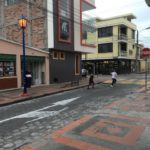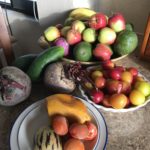 Gary and I fall asleep nightly to a chorus of street dogs barking the news of the day. Some kind of frog makes a croaking that sounds like sticks clicking together. We are awakened at dawn by church bells and roosters. The poor old church bells are non-melodious. They ring at the most random of times – 6:03 and 6:34 am and a few minutes before 7. Same in the evening… they ring at random moments that are somehow predetermined. Even the locals don’t seem to know why they ring at those certain times. After the last dull clang fades, we hear chickens clucking and squawking in waves across the valley. First, one barnyard goes off, then another, then another, echoing off both volcanoes.
Gary and I fall asleep nightly to a chorus of street dogs barking the news of the day. Some kind of frog makes a croaking that sounds like sticks clicking together. We are awakened at dawn by church bells and roosters. The poor old church bells are non-melodious. They ring at the most random of times – 6:03 and 6:34 am and a few minutes before 7. Same in the evening… they ring at random moments that are somehow predetermined. Even the locals don’t seem to know why they ring at those certain times. After the last dull clang fades, we hear chickens clucking and squawking in waves across the valley. First, one barnyard goes off, then another, then another, echoing off both volcanoes.
Carnival
 Like Mardi Gras, it’s Carnivale time: the weekend before Lent. Parades of musicians and dancers go down the streets at random times. Boys with squirt guns, water balloons, and shaving cream lurk in doorways, ready to douse the unsuspecting. Nobody is safe! Sidewalks are crowded with people from outlying areas. Both town squares host fireworks. I got squirted with water and shaving cream, and Gary got splashed a few times. When I got bold, I squirted a boy who ran past us with a squirt gun. He was surprised that a gray-haired gringa squirted him. He and his mom laughed with delight.
Like Mardi Gras, it’s Carnivale time: the weekend before Lent. Parades of musicians and dancers go down the streets at random times. Boys with squirt guns, water balloons, and shaving cream lurk in doorways, ready to douse the unsuspecting. Nobody is safe! Sidewalks are crowded with people from outlying areas. Both town squares host fireworks. I got squirted with water and shaving cream, and Gary got splashed a few times. When I got bold, I squirted a boy who ran past us with a squirt gun. He was surprised that a gray-haired gringa squirted him. He and his mom laughed with delight.
One afternoon we take a shuttle bus with expats from various countries to a serene, landscaped estate with stunning views, outside of town. A wonderful charity called “Ami” is housed there. They help indigenous Quechua children in need. Weekly movies help raise funds. The bus costs $1, the movie $5.
At the movie, or in some of the expat-run cafes, it’s nice to meet other “gringos” and discuss why they’re here. The primary reasons are the ability to live off Social Security, inexpensive medical care, temperate weather, and a relaxed lifestyle. Many find the US too dangerous. Those who are most successful at making a good life here are those who learn Spanish and integrate into the local community. It seems that the people who only speak English eventually feel isolated and frustrated by the small pool of acquaintances. There are some younger expat families here, but retirees predominate. Among the expats, a variety of lifestyles, personalities, and priorities exist in a kind of disharmonious harmony. Plenty of disharmonies, but everyone has to share a town anyway, so a type of harmony is created.
The Mercado
 Gary and I walk to the market (Mercado) on Sunday, when they have organic produce. Our backpack brims with tropical fruits. I buy 2 dozen splendid roses for $3. As always, we run into other gringos from our condo community where we’re staying and chat. Everyone shares news about what events are happening and who is hiring a driver to visit which other town or lake or park.
Gary and I walk to the market (Mercado) on Sunday, when they have organic produce. Our backpack brims with tropical fruits. I buy 2 dozen splendid roses for $3. As always, we run into other gringos from our condo community where we’re staying and chat. Everyone shares news about what events are happening and who is hiring a driver to visit which other town or lake or park.
At the Mercado and on the sidewalks, we encounter the Viejas. These are extremely old, tiny Quechua women who have no family. Most are well under 4’ tall, hunched, barefoot. They silently beg for food or coins, alongside the hungry street dogs. At night they sleep in a building called “Home for the Ancients”. The tiniest 3’ tall Vieja with cataracts gets coins and bananas from us when we pass. There are a few Viejos too… little ancient men with blurry eyes, begging.
We feel utterly safe strolling here. The sidewalks are filled with relaxed families and laughing children, plus gringos and vacationers. In the bigger cities, pickpocketing is a problem; it’s best not to carry a purse or have your cell phone in your pocket. In Cotacachi, that is not an issue from what I see. This is a sleepy, safe town where people know one another and not much happens. Everyone greets everyone on the sidewalks. The locals consider the U.S. expats to be, in general, cold and unfriendly because most don’t greet their neighbors as they pass. I get in the habit of greeting everyone and watch their faces light up to greet a friendly gringo.
After the market, we stop at our favorite spot, the Serendipity cafe, to give a few roses to the gorgeous young Quechua owner, Maria. She reaches way up to hug me (she’s 4-1/2’ tall) and draws me into a cheery conversation in Spanish, laughing warmly about my grammar and complimenting my progress. Gary orders guanabana juice and we stroll home, feeling surprisingly at home here in the quiet rhythm of Cotacachi.